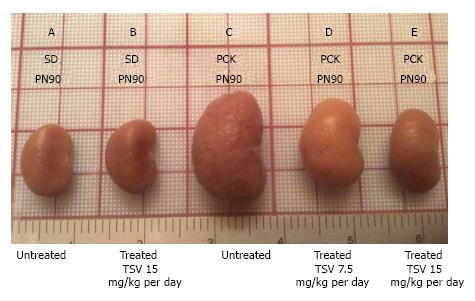Copyright
©The Author(s) 2017.
World J Nephrol. Jul 6, 2017; 6(4): 188-200
Published online Jul 6, 2017. doi: 10.5527/wjn.v6.i4.188
Published online Jul 6, 2017. doi: 10.5527/wjn.v6.i4.188
Figure 7 Tesevatinib treatment in the PCK model of autosomal recessive polycystic kidney disease.
Compared to wild-type SD control kidneys (A) at PN90, PCK cystic kidneys (C) are significantly enlarged by PN90. TSV treatment results in a dose-dependent reduction in the overall kidney size at doses of 7.5 mg/kg per day (D) and 15 mg/kg per day (E) when compared to untreated PCK cystic kidneys at PN90 (C). Treatment of wildtype SD with 15 mg/kg per day did not result in significant reduction of overall kidney size (B) compared to untreated wildtype SD animals. This correlates directly with the total kidney weight (TKW) of each group listed in Table 2 (Treatment interval: PN30-PN90). TSV: Tesevatinib.
- Citation: Sweeney WE, Frost P, Avner ED. Tesevatinib ameliorates progression of polycystic kidney disease in rodent models of autosomal recessive polycystic kidney disease. World J Nephrol 2017; 6(4): 188-200
- URL: https://www.wjgnet.com/2220-6124/full/v6/i4/188.htm
- DOI: https://dx.doi.org/10.5527/wjn.v6.i4.188









